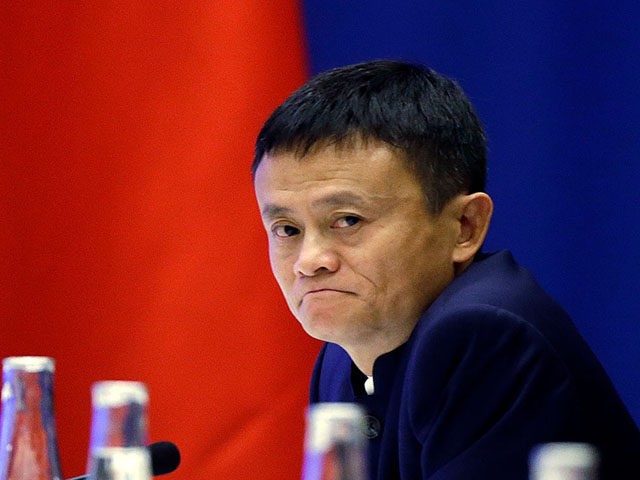Voice of America News (VOA) reported Monday that a theory about the curious disappearance of Chinese billionaire Jack Ma is growing in credibility among foreign observers: the true goal of the Chinese Communist Party (CCP) is pressuring Ma into handing over the vast trove of consumer credit data accumulated by his Alibaba e-commerce company and its titanic financial services offshoot, the Ant Group.
The flamboyant Ma, a multimedia celebrity in addition to once being China’s richest man, vanished from the public eye after criticizing the CCP’s heavy-handed financial regulators at a public forum in October. When speculation about his disappearance grew uncomfortable in early January, Chinese state media ominously reported Ma was busy “embracing supervision” and began trashing his reputation, referring to him as a “traitor” and a greedy “vampire.”
Ma reappeared, in a very limited fashion, on January 20 by delivering a video address to an award ceremony for teachers. His exact whereabouts remained unclear. By the time he resurfaced, Ma was no longer China’s richest man, having lost almost a quarter of his net worth while Chinese regulators broke up the Ant Group.
Some speculated Ma was quietly detained and “re-educated” after he spoke out against the CCP, while others thought he was keeping a low profile while attempting to save as much of his business empire as possible from regulators. Almost everyone assumed the incident was Chinese dictator Xi Jinping teaching Ma a harsh lesson about who runs China. Ma had become so rich and popular that he was seen as a real threat to Xi’s authoritarian rule.
VOA spoke Monday with observers who proposed a somewhat different interpretation of events, namely that the CCP is heavily pressuring Ma to hand over the huge amount of valuable data he has accumulated about Alibaba and Ant Group customers, enabling the Chinese government to improve its surveillance and “social credit” systems.
“What the Chinese Communist Party covets the most is the digital hegemonic power that Ma has possessed. That is, the dominance of three flows: flows of money, information and content,” a cybersecurity expert told VOA.
China could use Alibaba and Ant Group data to monitor borrowing and spending by Chinese citizens and pursue both real and imagined financial crimes, as part of the CCP’s endless “anti-corruption” campaign and political purge.
More disturbingly, VOA’s consultants noted that Ma’s companies have plenty of customers in other countries, and the CCP would be able to extend its surveillance to them as well, enabling crackdowns against everyone from dissidents living overseas to underground church groups.
Ma’s data could also become another “sharp power” instrument of economic leverage against foreign citizens, from Australia to America:
Now that Alibaba is exporting cloud-based services overseas, China may further be able to extend its digital authoritarianism beyond its borders by, for example, ordering the company to block foreign countries and their products such as Australian wine on its online platforms, according to the expert.
Currently, most of Alibaba’s active users are based in China, but company CEO Daniel Zhang has pledged to double its clientele, aiming to serve more than two billion customers globally by 2036.
The expert added that China is already capable of invading foreigners’ privacy by accessing personal data such as passport numbers through a “backdoor” inserted into China-made hardware. For example, China manufactures 90 percent of the world’s card readers, in which, backdoors can be exploited to pose security risks, he said.
Another analyst, Law Ka-chung of the Bank of Communications in Hong Kong, noted people would become even more “horrified and refrain from expressing dissenting opinions” if they knew the CCP had access to Alibaba’s trove of information about them.
Abishur Prakash of the Center for Innovating the Future in Toronto told VOA the Chinese Communists could be most interested in controlling Ma’s companies, and other Chinese tech giants, to use them as “tools of foreign policy” and “gain more leverage” over foreign governments.
Ma and other Chinese CEOs have long insisted their businesses are fully independent of the Chinese government — an absurd fiction that would disintegrate completely if they were obviously forced into the sort of role Prakash envisioned. This could make international companies and foreign governments more reluctant to do business with Chinese corporations, although as Xi’s triumphal speech to the World Economic Forum in Davos this week indicated, Beijing may believe the world no longer has any choice about doing business with China in the wake of the coronavirus pandemic.
Whatever pressure the CCP has brought to bear against Jack Ma, he can at least take some comfort in knowing that his damaged fortune is rebuilding itself. Bloomberg News estimated on Monday that Ma has recovered about $1.6 billion of his net worth since he reappeared last week as the Hong Kong stock exchange rallied.
He is still only the fourth-richest man in China, as the biggest winner from the market rally was another billionaire named Ma — Pony Ma, founder and CEO of Tencent Holdings, now China’s second-richest man behind Zhong Shanshan, chairman of the Nongfu Spring bottled water company.
Tencent’s market value is now approximately $949 billion, putting it just outside the trillion-dollar club occupied by Apple, Microsoft, and Google.

COMMENTS
Please let us know if you're having issues with commenting.